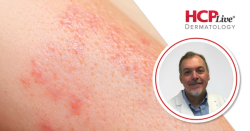
OR WAIT null SECS
Alitretinoin Superior to UV Therapy in Rapid Improvements to Chronic Hand Eczema
These data suggest more immediate benefits to alitretinoin, though ultraviolet therapy was shown to be cost-effective after 10 years of use.
Alitretinoin leads to more rapid improvement and superiority to ultraviolet therapy as a first-line treatment of patients with severe hand eczema at 12 weeks, new findings suggest, though such a difference was not observed at later points in time.1
These findings and others were the conclusions of new research authored in part by Miriam Wittmann, from Leeds Institute of Rheumatic and Musculoskeletal Medicine at the University of Leeds in Yorkshire, UK. The investigators had sought to make comparisons between alitretinoin and ultraviolet therapy as first-line treatments in terms of disease activity at the 12-week mark post planned initiation.
The team highlighted the condition’s importance, citing a study which had concluded that the overall pooled incidence of hand eczema among those in the general population appears to have risen during recent years.2
“The main question was which treatment was better at easing symptoms of severe hand eczema after 12 weeks,” Wittmann and colleagues wrote. “The two treatments compared were ones used most often by UK dermatologists.”1
Background and Design
The research team carried out a prospective, open-label, multicenter, two-arm parallel group trial, during which they used adaptive randomization as well as a single planned interim analysis and an economic assessment. This study took place in dermatology outpatient clinics located across the United Kingdom.
Participants involved in the study had been suffering from severe chronic hand eczema that had not improved after 4 weeks of treatment at least using potent topical corticosteroids. The team’s primary outcome which they evaluated was the natural logarithm of the Hand Eczema Severity Index + 1, evaluated 12 weeks following initiation of treatment.
Random assignment of participants in a 1:1 ratio through minimization was conducted, with subjects given either alitretinoin or ultraviolet therapy on a timeframe of 12 - 24 weeks. The investigators’ key focus of their research was to ascertain which of the 2 therapy options was more efficacious in the reducing of severe hand eczema symptoms after 12 weeks.
Alitretinoin, noted by the research team as a daily oral medication, was compared to ultraviolet therapy, during which subjects' hands are soaked in a special liquid and exposed to ultraviolet light twice-per-week within a hospital setting.
There were 220 subjects involved in the study who were treated with alitretinoin and 221 who were given ultraviolet therapy. The team’s treatment period lasted between 12 - 24 weeks, depending on how well participants’ eczema responded, and they could be given additional treatments afterward. The team also monitored their hand eczema symptoms for up to 1 year.
Notable Findings
Overall, the investigators concluded that 96.4% of those placed in the alitretinoin arm of the study and 88.7% of those featured in the ultraviolet therapy arm were at least a single dose of their respective therapies. By the 12-week mark, they reported that the unadjusted median relative change in the Hand Eczema Severity Index (HESI) was shown to be 30% for those in the alitretinoin cohort.
This was compared to only 50% for those receiving ultraviolet therapy. The investigators noted that alitretinoin demonstrated a statistically significant advantage over the ultraviolet therapy at 12 weeks, reporting that there had been an estimated fold change of 0.66 (95% CI: 0.52 to 0.82, P = .0003).
Despite this finding, there was not a significant distinction which the research team observed between the 2 options at the 24 and 52-week marks. The team noted fold changes of 0.92 (95% CI: 0.798 to 1.08) at the 24-week mark and 1.27 (95% CI: 0.97 to 1.67) at the 52-week mark.
By their research’s conclusion, 59% of those in the alitretinoin cohort and 61% of those in the ultraviolet cohort were successful in achieving a clear or almost clear rating. The investigators found that compliance to treatment differed significantly between the arms of the study, with 65.9% in alitretinoin and 24.0% in ultraviolet therapy having continued to maintain high levels of compliance (defined as receiving at least 80% of the treatment with a lack of breaks longer than a week during the initial 12 weeks). The team also encountered substantial missing data.
There were 135 adverse events that the investigators observed among 79 participants, and specifically among 25.0% from the alitretinoin arm and 10.9% from the ultraviolet therapy arm. There were 4 documented serious adverse events, 2 from each treatment cohort. No new safety concerns were observed during the trial.
“Long-term control of severe hand eczema is important. Individual discussions on the pros and cons of each treatment for hand eczema symptoms is needed,” they wrote. “Providing flexible options to attend ultraviolet therapy appointments could be helpful (e.g. weekend/evenings).”1
References
- Wittmann M, Smith IL, Nixon J, et al. Alitretinoin versus phototherapy as the first-line treatment in adults with severe chronic hand eczema: the ALPHA RCT. Health Technol Assess. 2024 Oct;28(59):1-123. doi: 10.3310/TWQC0141. PMID: 39364555; PMCID: PMC11472215.
- Quaade AS, Simonsen AB, Johansen JD, et al. Prevalence, incidence, and severity of hand eczema in the general population – a systematic review and meta-analysis. Contact Derm 2021;84(6):361–74. doi: 10.1111/cod.13804.


